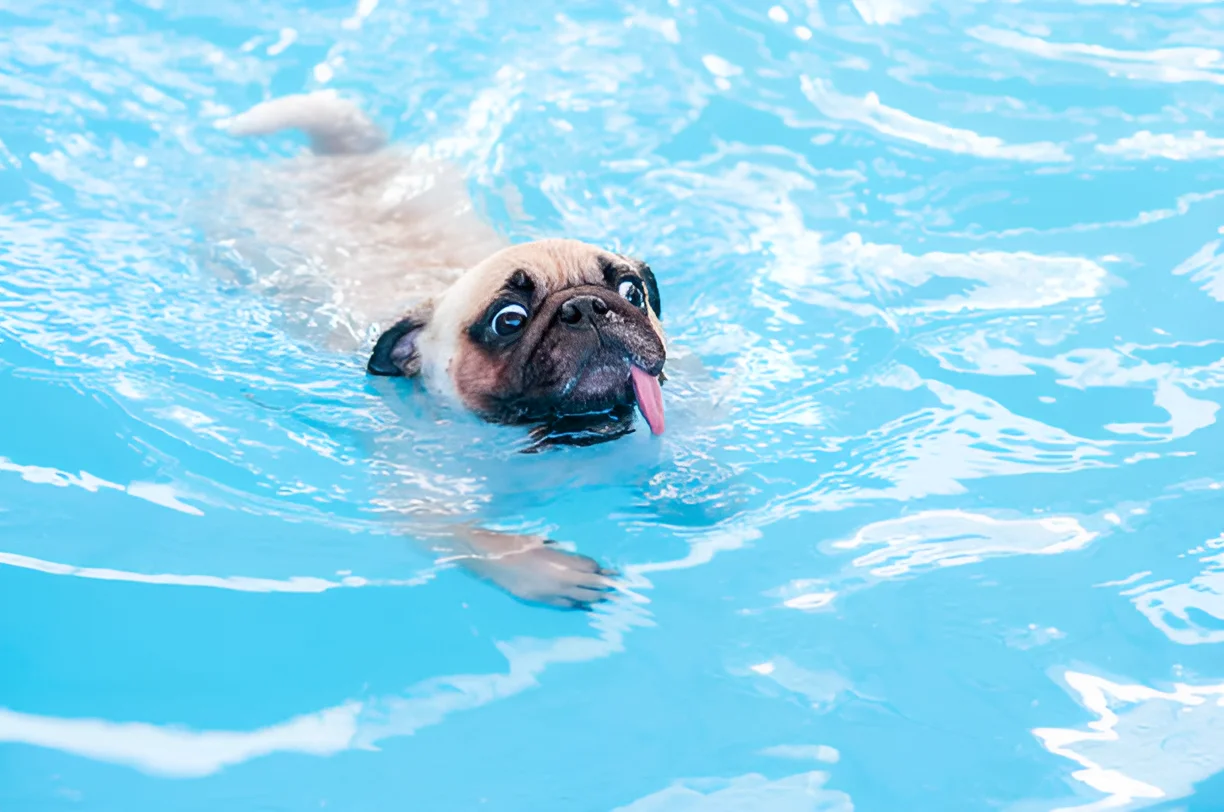Your dog may be coughing after swimming due to water inhalation, aspiration pneumonia, or exposure to irritants like chlorine or bacteria. Swimming is a fantastic activity for dogs, providing both exercise and fun. However, if your dog starts coughing after a swim, it can be concerning. This comprehensive article explores the various reasons why your dog might be coughing after swimming, how to identify the symptoms, and what steps you can take to ensure your pet’s health and safety.
Understanding the Causes of Coughing After Swimming
Water Inhalation
One of the most common reasons for a dog to cough after swimming is water inhalation. When dogs swim, they can accidentally inhale water, which can irritate their respiratory tract and cause coughing. This is often referred to as “dry drowning” or “secondary drowning,” where water enters the lungs and causes inflammation and irritation.
Aspiration Pneumonia
Aspiration pneumonia occurs when a dog inhales foreign substances, such as water, food, or vomit, into their lungs. This can lead to a bacterial infection and inflammation of the lungs, causing coughing, difficulty breathing, and lethargy. Aspiration pneumonia is a serious condition that requires immediate veterinary attention.
Chlorine and Pool Chemicals
Swimming in chlorinated pools can also cause coughing in dogs. Chlorine and other pool chemicals can irritate a dog’s respiratory system, leading to coughing and other symptoms such as red eyes and skin irritation. While occasional exposure to chlorinated water is generally safe, prolonged or frequent exposure can cause health issues.
Bacterial and Parasitic Infections
Natural bodies of water, such as lakes, rivers, and ponds, can harbor bacteria and parasites that can infect your dog. Common waterborne pathogens include Giardia, Leptospirosis, and Pseudomonas. These infections can cause coughing, diarrhea, vomiting, and other symptoms. It’s important to monitor your dog for signs of illness after swimming in natural water sources.
Blue-Green Algae
Blue-green algae, also known as cyanobacteria, can be extremely toxic to dogs. Found in stagnant water bodies, blue-green algae can cause severe health issues, including coughing, vomiting, diarrhea, and even death. If you suspect your dog has been exposed to blue-green algae, seek veterinary care immediately.
Identifying Symptoms and When to Seek Help
Symptoms to Watch For
If your dog is coughing after swimming, it’s important to monitor them for additional symptoms that may indicate a more serious condition. These symptoms include:
- Persistent coughing
- Difficulty breathing
- Lethargy or weakness
- Vomiting or diarrhea
- Fever
- Blue or pale gums
- Excessive drooling
When to Seek Veterinary Care
If your dog exhibits any of the above symptoms, or if their coughing persists for more than a few hours, it’s crucial to seek veterinary care. Early intervention can prevent complications and ensure your dog receives the appropriate treatment.
Preventive Measures and Care
Supervise Swimming Sessions
Always supervise your dog while they are swimming to prevent accidents and ensure they do not ingest too much water. Encourage breaks and provide fresh water to drink to reduce the risk of water inhalation and aspiration pneumonia.
Rinse Off After Swimming
After swimming, rinse your dog with fresh water to remove chlorine, salt, and any potential contaminants from their coat. This can help prevent skin irritation and reduce the risk of ingesting harmful substances when they groom themselves.
Avoid Stagnant Water
Avoid allowing your dog to swim in stagnant or potentially contaminated water sources. Stagnant water is more likely to harbor harmful bacteria, parasites, and blue-green algae. Opt for clean, flowing water or well-maintained pools.
Regular Veterinary Check-ups
Regular veterinary check-ups are essential for maintaining your dog’s health. Discuss your dog’s swimming habits with your veterinarian and ask for advice on preventive measures and vaccinations that can protect against waterborne diseases.
Treatment Options
Home Care
For mild cases of coughing due to water inhalation or minor irritation, home care may be sufficient. Ensure your dog rests and stays hydrated. Monitor their symptoms and provide a calm environment to help them recover.
Veterinary Treatment
For more severe cases, such as aspiration pneumonia or bacterial infections, veterinary treatment is necessary. Your veterinarian may prescribe antibiotics, anti-inflammatory medications, or other treatments based on the underlying cause of the coughing. In some cases, hospitalization may be required for intensive care and monitoring.
Conclusion
Coughing after swimming can be a sign of various health issues in dogs, ranging from mild irritation to serious conditions like aspiration pneumonia. By understanding the potential causes and taking preventive measures, you can help ensure your dog’s safety and well-being. Always monitor your dog for symptoms and seek veterinary care if needed to keep your furry friend healthy and happy.
The photo featured below the post headline is Credit: fongleon356/istockphoto
I hope you find this post helpful and informative. If Yes’ feel free to share it with your friends!
Frequently Asked Questions
Can dogs get sick from swimming in lakes?
Yes, dogs can get sick from swimming in lakes if the water is contaminated with bacteria, parasites, or blue-green algae. Always monitor your dog for symptoms after swimming and seek veterinary care if needed.
How can I prevent my dog from inhaling water while swimming?
Supervise your dog while swimming, encourage breaks, and provide fresh water to drink. Avoid throwing toys too far into the water and ensure your dog does not become overly tired.
What should I do if my dog starts coughing after swimming?
Monitor your dog for additional symptoms and provide rest and hydration. If the coughing persists or is accompanied by other symptoms, seek veterinary care immediately.
Is it safe for dogs to swim in chlorinated pools?
Occasional swimming in chlorinated pools is generally safe for dogs, but prolonged exposure can cause irritation. Rinse your dog with fresh water after swimming to remove chlorine from their coat.
Can blue-green algae harm my dog?
Yes, blue-green algae can be extremely toxic to dogs and can cause severe health issues or even death. Avoid allowing your dog to swim in or drink from water sources that may contain blue-green algae.

